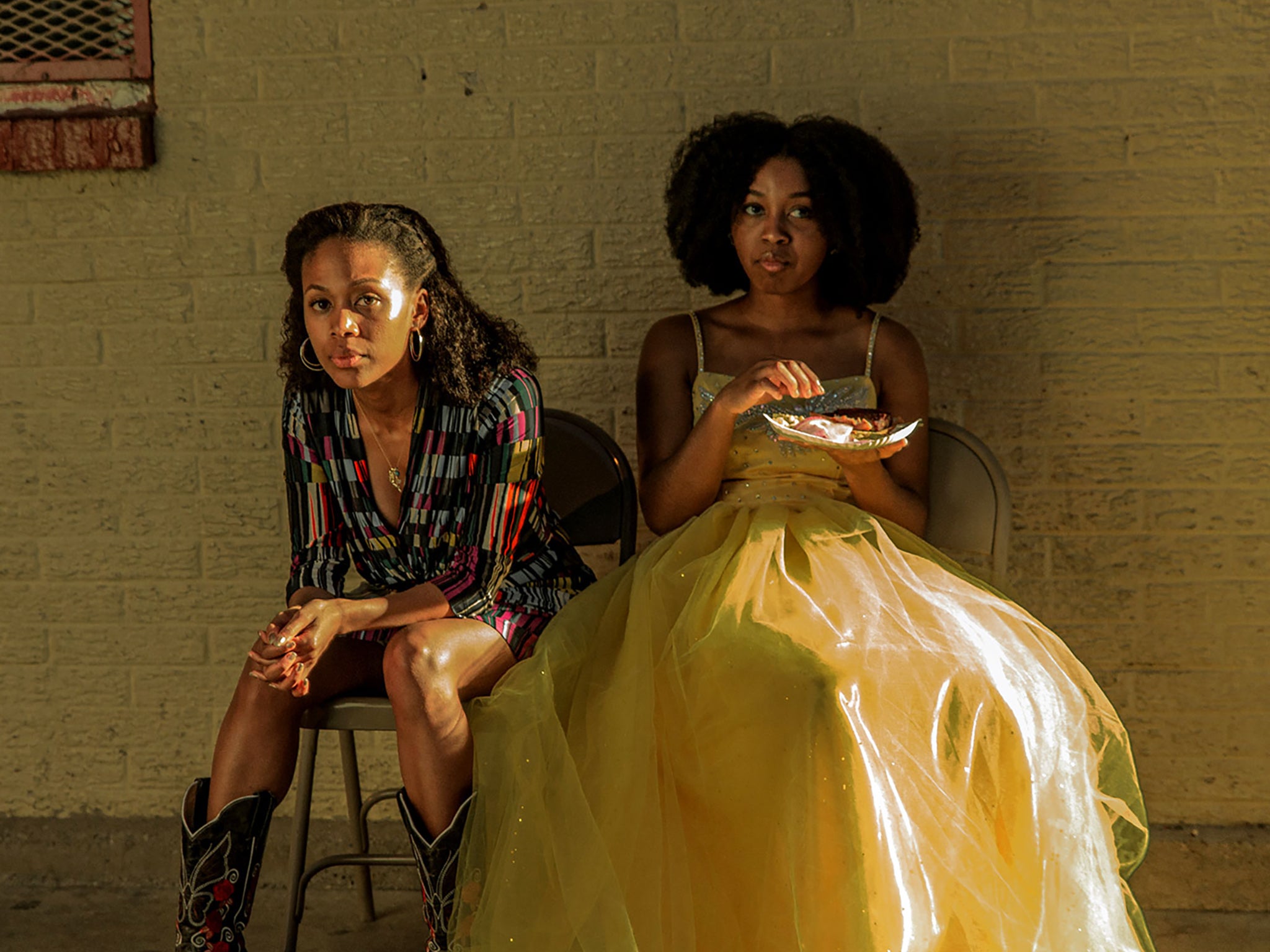Nicole Beharie: ‘Miss Juneteenth is not about a western ideal of beauty’
The acclaimed film is revitalising the American pageant story and celebrating what it means to be a black woman. But it’s more than a ‘Black Lives Matter movie’, its star Beharie and director Channing Godfrey Peoples tell Micha Frazer-Carroll


From Miss Congeniality to Little Miss Sunshine, beauty pageants are often the butt of the joke. For Hollywood writers, the gags are seemingly ripe for the picking: the spray tans, the sequins, the catwalking, the talent round; it’s an apparent battle to the death to project a specific image of femininity. But Miss Juneteenth, a new film following a black former beauty queen, who has high hopes for her daughter to follow in her footsteps, offers a different perspective. The titular “Miss Juneteenth” pageant, which commemorates the emancipation of enslaved people in the US, is one that debut writer-director Channing Godfrey Peoples attended herself throughout her own childhood.
“This story has been with me my whole life,” Peoples tells me. Both the holiday, and the pageant, were highly anticipated annual fixtures in her hometown of Fort Worth, Texas, and she’d never considered the celebrations unusual. “When I left Texas and went to film school in California, I’d say ‘Happy Juneteenth!’ to people, and they would look at me kind of curiously.” It seems that many Americans had never heard of its significance in the early aughts. “But it was such a big part of the fabric of my life – it was my version of Miss America.”
For the film’s protagonist, a working-class single mother named Turquoise (Nicole Beharie), the pageant carries a similar significance. In her youth, Turquoise won Miss Juneteenth, but her life plans were derailed when she became a teenage mother to her now 15-year-old daughter, Kai (Alexis Chikaeze). Turquoise became a sex worker, and now scrapes together tips working in her local bar to make ends meet. Her only dream is that Kai will wear the crown – and take the prize of a full college scholarship.
Miss Juneteenth offers contestants generous incentives in the way of social mobility, and in some ways resembles the pageants we’re used to seeing portrayed in American cinema. But there are some crucial differences. “Miss Juneteenth is not about proximity to a western ideal of beauty,” says lead actor Nicole Beharie. “Channing made it very clear… all the young ladies in the pageant are different shapes, sizes and heights. They have different hair. And the winner from the year prior is a curvy, confident, young black woman.”
Afros and curls particularly defy the archetypal image of a pageant – although at one point, we see true-to-life scenes of Kai’s hair being straightened using a traditional hot stove iron. “Having natural hair in the film was absolutely important to me,” Peoples says, “and it also links to the metaphor of the crown – black women wearing these crowns on our heads.” Beyond the physical appearances of the contestants, even fixtures like the talent round look different in Miss Juneteenth, with Kai performing Maya Angelou’s poem “Phenomenal Woman”. Beharie says: “These were not the kind of pageants that I grew up seeing on television occasionally – which, by the way, were produced by Donald Trump.”
All the supporting roles and extras, most of whom had never acted before, were from Peoples’s community in Fort Worth, which neighbours Dallas and has a black population of 19 per cent. In the tight-knit suburbs of the film, everyone knows everyone, and it’s the kind of place where you can’t go to your local bar without running into your mother. “Before I came down, I studied and worked hard on the dialect,” Beharie says, “and I went and worked at the bar a few times – just so it felt like second nature. I also learnt some of the dance steps and just spent a lot of time with the locals.”
The payoffs of Beharie’s immersion method are highly visible throughout the film. Her performance is deeply authentic and was, perhaps, even more bittersweet, as she had previously taken a years-long break from acting after she developed a serious illness while making the TV series Sleepy Hollow. “I also just feel more connected and embodied,” Beharie says, of her return to her craft, and that manifests relatably on screen in her cackle, her side-eye, her drawl-like delivery and even the way she carries herself.
Beharie had developed Clostridium difficile, and there were traumatic elements of recovery, which required her to take eight prescription medications at one point. And she was dropped from the Sleepy Hollow cast entirely. “There were moments of bitterness and anger, and also doubt and all of that good stuff,” she says warmly. “Now that conversation is one that we’ve all been having, about what our lives are worth and how we want to live them.”
“But,” she continues, with a nod to both coronavirus and Black Lives Matter, “I am more grateful than ever to have made it through and to be able to create something people can enjoy in such a crazy time.” She also points to former 42 co-star Chadwick Boseman’s death as another example of the fragility of health, and black life in particular. “It just really makes you think about what people are going through, and the different ways we all handle our obstacles.”
Neither Peoples nor Beharie could have predicted the climate that this film would be released during – in America, Miss Juneteenth came out at the height of the protests following the death of George Floyd. Relatedly, Juneteenth, as a holiday, was observed and talked about more widely than ever this year, making headlines after Trump scheduled his first campaign rally in Oklahoma on the day. While issues of anti-black racism circle back again and again in the film, Peoples is staunch that this is a theme that has a life beyond 2020: “We’ve been having these conversations in the black community for as long as I can remember.”
For Beharie, some of the film’s central conflict does serve as a metaphor for the current upheaval taking place across America. Turquoise relentlessly insists Kai is traditional to the point of occasional shaming, telling her to go back into her bedroom and put on more clothes when she is going out in shorts. But Kai has a distinctly rebellious spirit, rejecting respectability politics outright. “That’s true to life,” Beharie says. “At some point, new generations give you a wake up call, and tell you that it shouldn’t be this way. And that actually you just got tired, or you got lulled into thinking this is the way it is. I think that’s what the younger generations are doing now by standing up in protest, and it’s incredible.”
Of course, Miss Juneteenth isn’t simply a “Black Lives Matter Movie”. Peoples says that this is also a film about what it means to be a black woman. “I definitely see myself in Turquoise, but she’s also my mom, and my grandmother, my aunts, and the women in the community. There’s that sense of determination and that grit, but at the same time that grace. Growing up, you would see women working hard but you would barely see them sweat while they did it – or if they were sweating, they were sweating gracefully.”
There are also subtle calls to black history. Turquoise’s quest to live vicariously through her daughter’s potential success at times borders on obsession, as if she wants to rewrite her own story. Peoples tells me that this has a metaphorical link to the origins of Juneteenth, which doesn’t actually mark the emancipation proclamation but the day that slaves found out they were “free” in parts of Texas, a whole two years later. “I was constantly asking the question: what happens when freedom comes too late?” she says. “Turquoise is constantly navigating this idea that she won this pageant, but didn’t have the infrastructure to sustain what came of it… It is really about a dream deferred.”
Miss Juneteenth is a moving film about many things – poverty, beauty, blackness and womanhood – but perhaps, as Beharie and Peoples say, its most surprisingly relevant theme is that of intergenerational struggle, and sometimes conflict. Black women in particular must grapple with the wishes, hopes and dreams of our parents, and our ancestors that struggled for so long before them. And while there is so much that they weren’t able to do, how can we live out our own desires while also doing them justice? “We call it the ‘generational curse’,” Peoples laughs heartily. “That’s really what it’s about: what we inherit, what we leave behind, and what we choose to take forward.”
Join our commenting forum
Join thought-provoking conversations, follow other Independent readers and see their replies
Comments
Bookmark popover
Removed from bookmarks